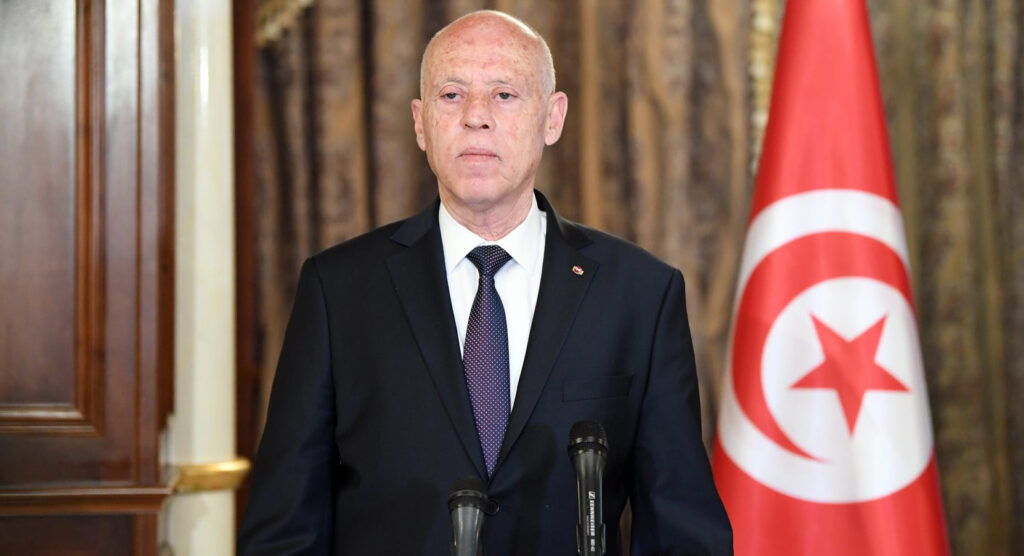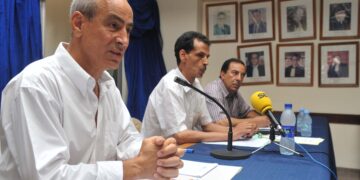Indefinite Suspension of Parliament Shows that Emergency Measures Are Not Temporary
عربي
(Washington, D.C., August 25, 2021) – The militarily-enforced and now indefinite suspension of parliament, dismissal of the Head of Government Hichem Mechichi, and subsequent arrests and travel bans of political leaders by Tunisian President Kais Saied constitute a coup against the democratically elected government of Tunisia. The Biden administration should recognize these measures as a coup and suspend aid to the country as required by U.S. law, said Democracy for the Arab World Now (DAWN).
"President Saied has now made clear that his actions are neither temporary nor tied to any actual national emergency, but simply a power grab to seize control of the country from its democratically elected institutions," said John Hursh, DAWN's Program Director. "By not calling these actions a coup to evade a suspension of U.S. aid, President Biden is giving Saied the implied backing he wants to solidify his power and make his coup permanent."
On August 24, Tunisian President Kais Saied announced that the previously declared short term suspension of parliament would now be indefinite, after a July 25 power grab that saw him dismiss the Head of Government, close parliament, and grant himself broad executive power. Saied made this announcement at midnight on Monday night via Facebook, as the 30-day emergency period that he implemented on July 25 expired. Saied's government has not published a legal decree to support these actions, nor has Saied offered a public justification, only promising that he will make a speech in the next few days.
By extending his power grab without any timetable for restoring parliament or appointing a new Head of Government, Saied is cementing his executive overreach and further dismantling Tunisia's democracy."
- John Hursh, DAWN's Program Director
"Any doubt that Saied implemented a coup on July 25 can now be put to rest," Hursh said. "By extending his power grab without any timetable for restoring parliament or appointing a new Head of Government, Saied is cementing his executive overreach and further dismantling Tunisia's democracy."
On July 25, Saied dismissed the Head of Government and suspended parliament after invoking emergency powers. Saied initially pledged that these actions would be temporary, lasting for 30 days. Acting with the support of the Tunisian military, Saied stated that he would govern alongside a new head of government, but he has not provided any details as to when he would make this appointment.
In his nationally televised speech announcing his actions, Saied said these emergency decisions would last "until we save the state" and that "the armed forces will respond with bullets" if required. By hinting at a long-term power grab with the military's backing and a promise to use force against his opponents, Saied risks escalating a political crisis into civil unrest and violent confrontation.
The next day, Tunisian police raided the offices of Al Jazeera. Tunisian security offices acted without a warrant and did not allow Al Jazeera employees to retrieve their personal belongings. They also confiscated all keys to the office, which remains closed.
Tunisian soldiers then blocked the entrance of the parliament building and refused to allow members of parliament to enter. Saied also removed the Defense and Justice Ministers, appointed former top-ranking police official Ridha Gharsallaoui Interior Minister, and imposed a month-long curfew, while prohibiting most intercity travel and public gatherings of more than three people.

President of Tunisia Kais Saied.
Source: Getty IMages
On July 30, Tunisian security forces arrested Yassine Ayari, a member of parliament and popular blogger who called Saied's actions "a military coup." Ayari is a member of the Hope and Labor political party, which stated that members of Saied's security team arrested Ayari without a warrant. A Tunisian military court convicted Ayari of "defaming the army" and sentenced him to three months in prison on June 26, 2018 for a Facebook post published on April 28, 2017. Numerous human rights organizations sharply criticized this decision.
Also on July 30, security forces placed Judge Bashir al-Akrami under house arrest for 40 days, although officials could renew this sentence. On August 6, Saied's recently appointed Interior Minister placed Anouar Maarouf, the former Communications Technology and Digital Technology Minister and a senior member of the Ennahda party, under house arrest. Maarouf is the first member of parliament to be placed under house arrest since Saied suspended parliament. On August 7, the government arrested two more members of parliament, Maher Zid and Mohamed Affes, both members of the opposition Al-Karama party and both critical of Saied.
On August 10, Saied issued a travel ban on 12 officials "suspected of corruption," but he has not provided any details of these alleged corrupt dealings. On August 20, Tunisian security forces placed Chaouki Tabib, the former Head of Tunisia's Anti-Corruption Committee, under house arrest after taking over the Committee's headquarters and evacuating its employees. The following day, Saied threatened the judiciary to apply a travel ban on members of the judiciary after a recent decision found the arbitrary arrest of a judge was unlawful and ordered her release.
Previously, Saied unilaterally stripped parliament members of their immunity from prosecution while appointing himself supervisor of the Office of Public Prosecution. He has yet to justify this move, through declaration or legal decree. All of these actions concentrate power in one individual, eviscerate the power sharing decreed by parliament between the president, the head of government, and parliament, and risk a permanent return to an authoritarian state.
"Authoritarian governments throughout the Middle East and North Africa welcome U.S. indecision on Tunisia, as the collapse of the last Arab Spring democracy will only embolden these autocratic leaders to further disregard human rights and the rule of law," Hursh added. "Rather than allowing these leaders to expand their influence, the Biden administration should make clear that U.S. support to the Tunisian government is contingent on its respect for the democratic and political rights of all Tunisians."
"By invoking the emergency powers of Article 80 of the Constitution but blocking the establishment of the Constitutional Court meant to check the abuse of such powers, Saied deliberately created an indeterminate legal situation to further his executive overreach."
- - John Hursh, DAWN's Program Director
Saied claims to have acted within his legal powers, arguing that Article 80 of the Tunisian Constitution provides him the authority to dismiss the government, appoint a temporary administration, and suspend parliament. Article 80 does provide the president broad powers in exceptional circumstances, but it also requires that "imminent danger" threatens the nation's institutions or the very security and independence of the country.
Further, the president must first consult with the Head of Government and the Speaker of the Assembly of Representatives (Tunisia's Parliament) and inform the President of the Constitutional Court of this decision.
Substantively, Tunisia clearly does not face "imminent danger," as contemplated by the constitutional drafters. While the country does face serious political and economic crises, this situation has not changed since Saied became president and it cannot be said to create an imminent danger.
Procedurally, Saied did not follow the requirements set forth in the constitution, as Rached Ghannouchi, the Speaker of Parliament, said that Saied did not consult him before acting despite the Article 80 requirement to do so. Nor does the Constitution allow the President to suspend parliament, as Article 80 requires Parliament be deemed "to be in a state of continuous session" throughout the emergency period.
Moreover, Tunisian officials have not yet established the Constitutional Court, the permission of which any exercise of emergency powers requires. Saied refused to ratify a bill that parliament passed in April that would have established the court and blocked constitutional amendments that would limit executive power. These decisions took on greater significance after July 25, since Article 80 allows the Speaker or thirty members of parliament to ask the Constitutional Court whether the exceptional circumstances allowing the president to apply emergency powers still exist.
"By invoking the emergency powers of Article 80 of the Constitution but blocking the establishment of the Constitutional Court meant to check the abuse of such powers, Saied deliberately created an indeterminate legal situation to further his executive overreach," said Hursh. "A plain reading of the constitution requiring judicial oversight of emergency powers makes clear that the Tunisian people wanted to avoid exactly the sort of power grab we are now seeing."
U.S. law prohibits foreign assistance to any country "whose duly elected head of government is deposed by military coup d'état or decree" or through "a coup d'état or decree in which the military plays a decisive role." Given the Tunisian military's role in blocking parliament, detaining the head of government, and refusing to allow members of parliament to conduct their legislative duties, it is clear that the Tunisian military has played a decisive, if limited role in supporting Saied's coup.
The United States has contributed nearly $700 million to Tunisia since its 2011 democratic revolution, including efforts to improve economic growth, enhance security, and promote democracy and civil society. More than $80 million has gone directly to initiatives that support good governance and fiscal transparency.
On June 30, the Millennium Challenge Corporation, a U.S. agency that works to reduce poverty through economic growth by providing grants and assistance to countries that meet rigorous good governance standards, approved a $498.7 million compact with Tunisia to help strengthen the country's transportation, trade, and water sectors. The U.S. government should suspend this and other non-essential aid until Saied allows parliament to resume meeting and he fully relinquishes his power grab.
"In addition to its legal obligations, the U.S. government has considerable economic leverage to push Saied to reinstate parliament and walk back his actions, now, before it's too late to undo his coup," said Hursh. "The U.S. has no business giving Saied any additional aid—the very purpose of which is to support Tunisia's democracy—as Saied actively dismantles Tunisia's democratic institutions and freedoms."
This crisis also presents the Biden administration with a key opportunity to give substance to its rhetoric for restoring democratic values to U.S. foreign policy and breaking from the Trump administration's embrace of authoritarian leaders. Thus far, the Biden administration has taken an especially cautious approach, noting its concern with the situation in Tunisia, but avoiding the question of whether Saied's actions constitute a coup. Secretary of State Antony Blinken spoke with Saied on July 26, but only encouraged him "to adhere to the principles of democracy and human rights."
The State Department issued a separate statement the same day, stressing the need to base solutions to Tunisia's political and economic problems on the Tunisian constitution and principles of democracy, human rights, and freedom. Blinken has since urged Saied to return Tunisia "to the democratic path." Most recently, senior administration officials met with Saied on August 13 and also urged "a swift return" to parliamentary democracy.
In contrast, prominent Tunisian constitutional lawyer and legal scholar Yadh Ben Achour called Saied's actions "a coup in the fullest sense of the word," while Tarek Megerisi, a senior policy fellow at the European Council on Foreign Relations, called it "a textbook self-coup." Other democratic countries also have taken a more critical stance towards Saied's legal reasoning, as a spokesperson for the German Foreign Office called the legal rationale for suspending Tunisia's parliament "a rather broad interpretation of the constitution."
Since Saied's dismissal of parliament and power grab, Saudi, UAE, and Egyptian officials have issued statements in support of his actions. Egypt's Foreign Minister Sameh Shoukry affirmed Egypt's "full support," a message reiterated in a statement provided by Egypt's Ministry of Foreign Affairs. Saudi Arabia and the UAE have reportedly promised Saied $5 billion in loans to support his control over the country.
These financial promises could be intended as a back-up plan for Saied, as his actions undermine the country's ability to secure new financing from the International Monetary Fund (IMF). Tunisia is seeking a $4 billion loan from the IMF to stabilize its national debt payments. However, analysts now question the feasibility of securing this loan because of the political crisis Saied unleashed. In the meantime, currency bonds issued by the Tunisian Central Bank dropped record amounts.
"The Biden administration apparently prefers to take a wait and see approach before acting, but inaction has its own costs," said Hursh. "Continued U.S. aid in the face of Tunisia's coup is effectively a vote in support of Saied and against a democratic Tunisia."







































